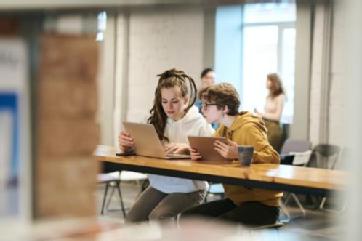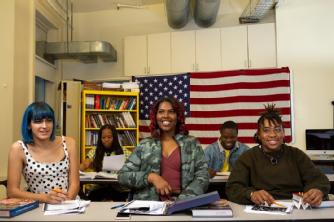-
This Learning Circle, led by John Kirkman and Richard Smith (2019–2023), developed and promoted Exploratory Pedagogic Inquiry (EPI) — a practical approach for teachers to reflect on and improve their teaching.
-
Through peer-coaching and group discussions, participants gained new perspectives, research skills, and greater confidence in their teaching practice.
-
The Circle also explored ethics, documentation, and ways to share the EPI approach across the university before pausing its activities.
Past Learning Circles
The following Learning Circles have achieved or exceeded their original aims (Peer Mentoring and Neurodiversity and the Student Experience) and are currently transitioning into a Network or Forum. This is in order that work to sustain and effectively embed policy and/or practice across the University can continue. Further information on the Networks/Forums will follow soon, but please do visit the pages to learn more about these past Learning Circles and the Learning Circles below that have now closed.
Authentic Learning
-
Formerly led by Catherine Bennett, this Learning Circle focused on authentic learning, connecting students’ learning to real-world issues and experiences.
-
The group developed a taxonomy, defined pedagogy, and collected case examples to support authentic learning across Warwick.
-
Outputs included a web page, idea cards, and resources to help staff design learning activities that engage students with real-world problems and external stakeholders.
Curriculum Review Framework

-
Led by Jennie Mills (ADC), this Learning Circle explored the development of a Curriculum Review Framework at Warwick.
-
The group shared practices, discussed framework design, and considered ways to involve students in curriculum review.
-
Its work aimed to inform the framework’s content and structure, raise institutional awareness, and support pilot implementation and evaluation.
Co-creation
-
This Learning Circle explored co-creation practices at Warwick, fostering collaboration between students, academic staff, professional services, and external partners.
-
The group examined literature, challenged traditional roles, and built a community to improve curriculum development and project work through partnership.
-
Outputs included case studies, policy recommendations, and a research paper on co-creation in Higher Education.
Education for Sustainable Development

-
Led by Lory Barile (Economics), this Learning Circle focused on embedding Education for Sustainable Development (ESD) into Warwick’s curriculum and wider university activities.
-
The group reviewed current practices, shared sector best practices, and built a network of staff and students to support sustainability and climate justice in teaching and learning.
-
Their work produced guidance for staff, promoted interdisciplinary collaboration, and informed the University’s sustainability strategy, with ongoing work continuing through the ESD network
- See also: Co-creating sustainable solutions, using a design-thinking approach
Enhancing the VLE
-
Led by Richard Clay and Jim Judges, this Learning Circle focused on improving Warwick’s Virtual Learning Environment (VLE), especially in response to Covid-19’s shift to online learning.
-
The group gathered feedback from staff and students, explored usability, accessibility, and new technologies, and shared best practices for teaching and learning.
-
Their work produced recommendations to guide the development and enhancement of Moodle and other VLE tools at Warwick.
Inclusive Policy and Practice for Disabled Students
-
Led by Jagjeet Jutley-Nelson and Elena Riva, this Learning Circle focused on inclusive policy and practice for disabled students at Warwick.
-
The group developed a co-produced code of practice to guide staff on supporting disabled students’ academic and wider experiences.
-
Work continues beyond the Circle through collaboration with Disability Services and ongoing efforts to embed inclusive and wellbeing practices across the university.
Interdisciplinarity

-
Led by Catherine Hale and Jo Wale, this Learning Circle focused on interdisciplinary teaching and initiatives at Warwick.
-
The group gathered data, shared good practice, and created a Warwick inventory of interdisciplinary opportunities, highlighted via a MyWarwick space.
-
Its aims included promoting cross-disciplinary collaboration, developing new initiatives, enhancing student learning, and supporting the Interdisciplinarity Hub with resources and guidance.
Learning Analytics

-
Led by Russell Boyatt (ITS), this Learning Circle explored the use of learning analytics to enhance the student experience.
-
The group examined ethical, policy, and practical issues around collecting and using student data.
-
Discussions focused on privacy, consent, data-informed teaching, and the impact of analytics on both students and staff.
Learning from Crisis

-
Led by Naomi de la Tour and Tiana Holgate, this Learning Circle was created in response to the Covid-19 pandemic to understand its impact on teaching and learning at Warwick.
-
The group gathered insights from staff and students to identify which new practices to keep, adapt, or leave behind after the crisis.
-
Its work informed university recommendations and post-pandemic teaching policy, helping shape Warwick’s approach to future change.
Lecture Capture
-
Led by Chih-Hsiang Lo, Tom Ritchie, and Jessica Humphreys, this Learning Circle reviewed and made policy recommendations on the use of Lecture Capture at Warwick.
-
The group gathered student feedback, compared practices with other universities, and discussed its impact on both student and staff experience.
-
Their work resulted in a 2023 report with detailed recommendations to guide Warwick’s future Lecture Capture policy and practice.
Module Evaluation

-
Led by Gwen van der Velden and later Cathy Hampton (SMLC), this Learning Circle explored how module evaluation and Student Module Feedback (SMF) were carried out across Warwick to share good practice and improve consistency.
-
The group collaborated with ITS to develop an online SMF tool, create core survey questions, and produce university-wide guidance and policy on module evaluation.
-
Its work led to pilot studies, new policy documents, and clearer guidance for staff and students on collecting and using feedback effectively
Pedagogic Research in HE
Restorative Justice in HE

Co-led by Jane Bryan (Law) and Amanda Wilson (Law), this Learning Circle aims to:
- Explore how Restorative Justice works in other institutions (within and outside of HE)
- Explore the literature on Restorative Justice and develop an evidence base relevant to Warwick
- Engage with stakeholders from across the university and explore ways in which Restorative Justice processes might be used at Warwick
Review of Self-Certification Policy & Procedures

-
Co-led by Andrew Clark (Chemistry) and Leda Mirbahai (WMS), this WIHEA Learning Circle examined how the self-certification policy was implemented and experienced across university departments.
-
The group collected feedback from students and staff, shared good practices, and created guidance to help departments make informed decisions about applying the policy.
-
Its work produced training materials and a report for university committees to support consistent, effective use of the self-certification policy
Student Voice/Experience

-
This WIHEA Learning Circle, currently on hold, focused on empowering authentic student voices in shaping the educational experience in higher education.
-
The group engaged with research and literature, identified new areas for study, and promoted writing on student voice and engagement.
-
Insights from the Circle informed a WIHEA-funded project and influenced university policy and practice through the Dean of Students’ office and wider discussions on student experience.
Trans & Queer Pedagogies

Co-led by Sam Parr (SU) and Luke Hodson (Psychology), this Open Learning Circle looked at gender inclusive teaching and queer pedagogy in particular. The group will:
- Research and discuss existing literature
- Share teaching and learning practices
- Explore the trans student learning experience
Wellbeing Pedagogies
Led by Elena Riva and Martin Mik. This Circle was to be a space for:
- Sharing practice
- Thinking of how we can design a whole educational experience, from teaching space, to curriculum, to activities, to reading materials, and to assessment, that supports positive student wellbeing
- Exploring the existing literature
- Engaging with the different stakeholders across Warwick University for improving students and staff wellbeing in the teaching and learning environment
